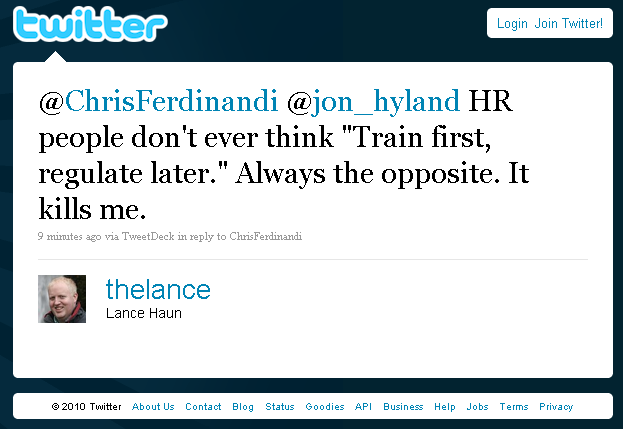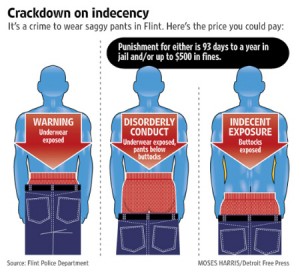If you’ve hung around here for very long, you know I’m not a big fan of policies. We don’t have a massive handbook for new hires that they have to sign on the first day claiming that they’ve read and understood the entire thing. I don’t look for opportunities to create new policies. I don’t let managers talk me into creating new policies.
 So I’ve set the stage, right? I am very un-policy relative to my companions in the HR profession.
So I’ve set the stage, right? I am very un-policy relative to my companions in the HR profession.
The policy alternative
What I do instead is offer coaching for managers and employees on how to handle issues.
Have an employee who’s consistently coming in late? That’s not against any rules. How’s her performance? Oh, that’s suffering? Then let’s have a talk with her about that, not the time she’s coming in to work.
Every time something comes up that we don’t currently have a policy for, I push for coaching and communication. And I might sound like a broken record, but I have managers who now laugh when they start telling me a problem, because they know that the answer is not going to be a shiny new policy or a rule.
But I do understand that this isn’t a permanent solution. We do have some policies on key things (timekeeping, paid time off, etc.) that people can check out on the intranet.
What I really want to know is where the tipping point is.
When do policies make sense?
When are we large enough for a policy to make sense? The thing that I keep thinking of is that a few isolated incidents are coaching issues. Here is the internal checklist I use to determine when a policy might be the answer:
- Is this a major legal risk if we don’t have this policy in place? Be realistic!
- Is this going to impact our customers negatively if we don’t have a policy in place?
- Is it going to disrupt operations internally if we don’t have a policy? (Note: additional coaching time for HR/managers is not enough to warrant this.)
- Are we distributed enough that we are no longer comfortable with local managers making these decisions? Is it a problem with our managers?
That’s not the entire list, but it’s the first initial steps I take when trying to determine if a policy is worth creating.
Advice on keeping your policies manageable
Tim Gardner, another HR blogger and friend, has some great advice.
To your question: Create a policy when existing policies and practices are either in conflict with the businesses needs, or inadequate for the potential of a situation that is likely to re-occur. And think about a policies like clothes in a full closet. If something comes in, is there something you aren't likely to wear again that you can get rid of?
My two biggest rules for policy creation were outlined in a post from 3 years ago, and they still ring true for me today.
- Don’t create a policy for the sake of having one
- Don’t create policies for outliers
And finally, if you have never read my Open Letter to HR on Policies and Training, then you should stop and take two minutes to do that now. It was a semi-rant that I wrote a while back to address the crazy trend of employers trying to use policies instead of common sense.
I’d love to hear from some of you with a similar mindset of policy minimalism. When do you decide to put a new policy in place? Why? What’s your criteria? Do you ever revisit “old” ones to update or eliminate?Â


 The corporate culture influences the determination from the initial consideration through to the final steps of implementation. Over at the Brandon Hall Group blog, we'll look at some of those underlying factors and how you can leverage them to make policy decisions stick.
The corporate culture influences the determination from the initial consideration through to the final steps of implementation. Over at the Brandon Hall Group blog, we'll look at some of those underlying factors and how you can leverage them to make policy decisions stick. So I’ve set the stage, right? I am very un-policy relative to my companions in the HR profession.
So I’ve set the stage, right? I am very un-policy relative to my companions in the HR profession.
